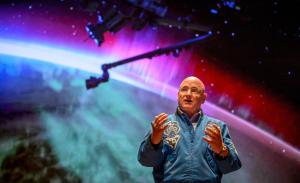March 8 (UPI) — In the spring of 2016, after two decades at NASA — and a total of 520 days aboard the International Space Station — former astronaut Scott Kelly retired, leaving him a lot more free time. Free time he’s now using to promote appreciation for science.
Kelly recently teamed up with the chemical and manufacturing company 3M to launch the State of Science Index, a study of people’s attitudes toward science.
Researchers gathered survey responses from 14,036 adults living in 14 countries, and the results, published this week, suggest that while many are optimistic about the potential for science to solve problems, a sizable portion of the planet’s population is skeptical of science.
“The thing that surprised me most was that 38 percent of people thought their lives would be the same if science didn’t exist,” Kelly told UPI.
Kelly said he’s also concerned that more than a third of survey respondents said science and scientific careers are only accessible to “geniuses.”
“I was just a kid that couldn’t do homework and was underperforming in school, but with some inspiration and hard work, was able to work in a very, very complicated scientific field,” Kelly said.
“There is no science gene,” he said. “It might come easier to some people than others, but the field is open to anyone who is willing to put in the hard work.”
Despite the public impression that entrance into most scientific fields is too intellectually demanding, evidence suggests more young people are earning STEM degrees — degrees related to science, technology, engineering and mathematics.
When asked about the link between public attitudes toward science and scientific problems like global warming, Kelly alluded to the importance of engaging the next generation of problem solvers.
“In 2020, we’re going to have 9 billion people on the planet, those people will have an effect on the climate, on food availability and on water availability,” Kelly said. “These are issues that can only be solved with science.”
Increased engagement with science starts with breaking down barriers — like gender barriers. Kelly is the father of two daughters, and he hopes to show them and others that a future in science is available to everyone.
“There is a gender problem in science, and highlighting that this is a real issue is the first step to solving the issue,” Kelly said. “We can show them how science can solve the problems of the future.”
Part of the solving these issues, Kelly said, is to introduce students to all of the different career opportunities available through science.
And while he said he’s “not an expert” on whether increased public funding for science and research could help aid scientific problem solving, there is much that can be done to help nudge more people toward being scientifically engaged.
“We as parents, mentors, and relatives need to help draw a connection between a student’s passion point and a science field,” Kelly said. “The more we can help students understand the they can improve lives through science, the more — I think — they’ll be engaged in the field.”

COMMENTS
Please let us know if you're having issues with commenting.